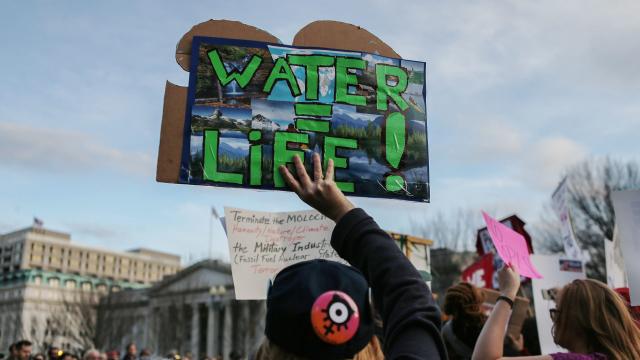We need water to cook and wash our bodies and clothes, and especially to drink — without it, we can’t live. Despite this, Wall Street traders are going to start betting on it as a commodity.
This week, with the launch of $US1.1 ($1.4) billion contracts tied to water prices in California, the Chicago Mercantile Exchange will launch the country’s first water market. It will allow farmers, hedge funds, and municipalities to essentially make wagers on the price of water and likelihood of water scarcity. Water will be a commodity, like gold or oil.
“What this represents is a cynical attempt at setting up what’s almost like a betting casino so some people can make money from others suffering,” Basav Sen, climate justice project director at the Institute for Policy Studies, said. “My first reaction when I saw this was horror, but we’ve also seen this coming for quite some time.”
That’s because we’ve known for decades that freshwater is becoming a scarcer resource in the U.S. due to the interlocking threats of extreme heat and drought, overuse of water for agriculture and other industries, and pollution. The launch of the water market means that powerful people will now literally be invested in those dangers taking a toll on access to a basic human need.
“As clean, useable water is becoming scarcer, the incentives in capitalism work to commodify it, and work to ensure that the scarcity is an opportunity to make money,” Sen said. “It’s the way in which capitalism makes profits from human misery.”
This terrifying development sets up some perverse incentives for truly despicable behaviour. For instance, in cases where water traders have made bets on scarcity, they could financially benefit from intervening in water distribution to limit access. This kind of abuse took place in Australia’s water trading scheme, when officials artificially inflated the price of water for their economic gain.
But even in cases where there’s no overtly shady dealing, the incentives set up by the water futures market are dangerous. In major urban areas, more than 500,000 people lack access to running water. Swaths of rural America, particularly on Indigenous land such as the Navajo Nation, also face access issues. Water should be a human right, but now there will be a group of Wall Street players who would be hurt monetarily by any policies that promote universal access to it.
“They will become powerful political force who can spend money to lobby against any efforts to de-commodify water,” Sen said. “That’s just wrong.”
